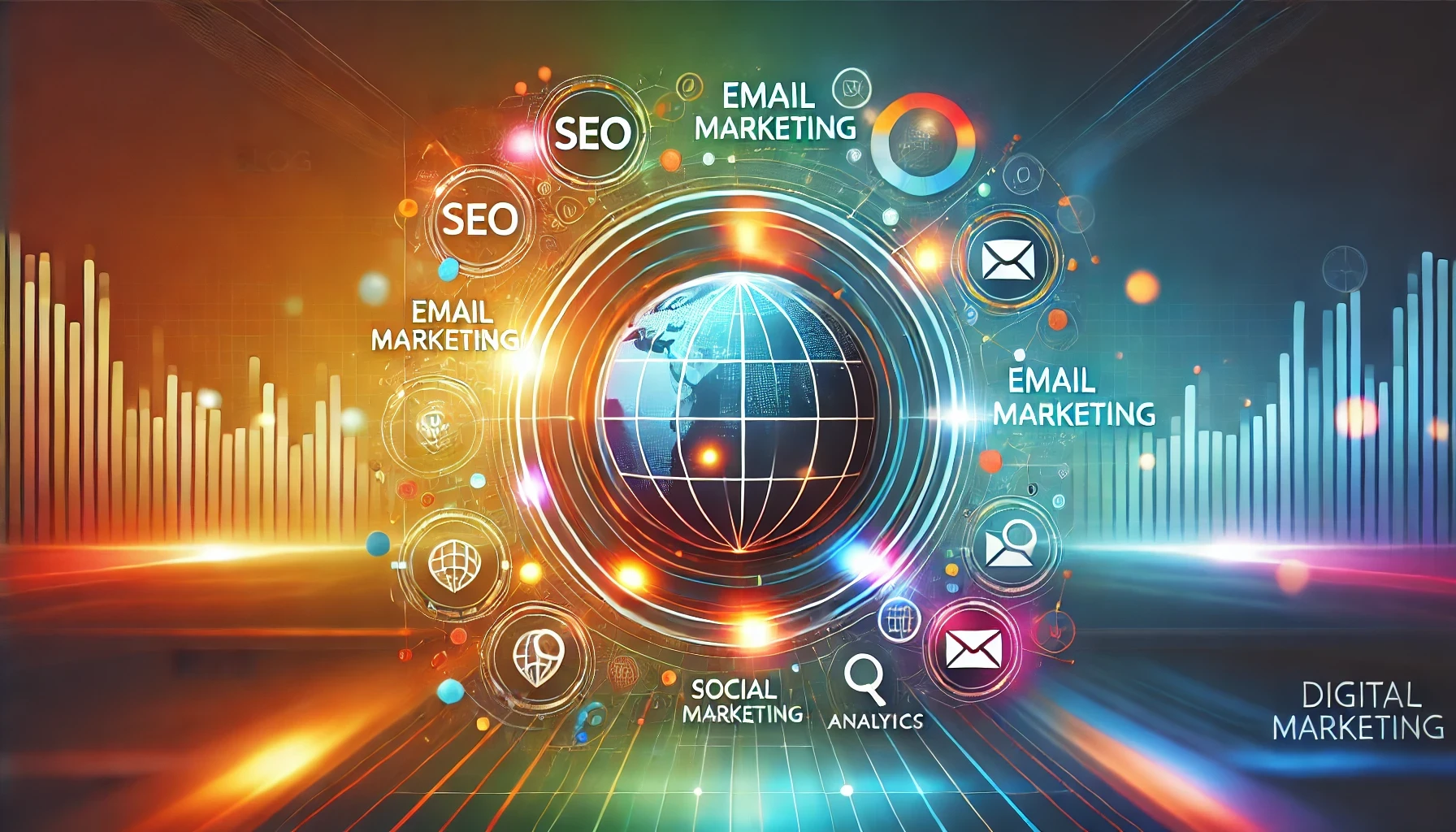What Is Digital Marketing? Why Every Business Needs Digital Marketing
In today’s digital-first world, traditional marketing methods like flyers, billboards, and TV ads are no longer enough to reach your audience. People spend most of their time online, whether it’s browsing social media, shopping, or searching for information. This is where digital marketing comes in. It helps businesses connect with their audience using online platforms, tools, and strategies. In this blog, we’ll explain what digital marketing is and why it’s essential for businesses of all sizes.
What Is Digital Marketing?
Digital marketing refers to promoting products or services through digital channels like websites, social media, email, and search engines. Unlike traditional marketing, digital marketing allows businesses to engage directly with their customers online. It includes techniques like:
Search Engine Optimization (SEO): Improving your website’s visibility on Google and other search engines.
Social Media Marketing (SMM): Promoting your brand on platforms like Instagram, Facebook, and LinkedIn.
Content Marketing: Creating blogs, videos, and infographics to provide value and attract customers.
Email Marketing: Sending personalized messages to build customer relationships.
Pay-Per-Click Advertising (PPC): Running paid ads on search engines or social media to drive traffic.
Why Every Business Needs Digital Marketing
1. Reach a Larger Audience
With billions of people using the internet, digital marketing allows businesses to reach a global audience. No matter where your customers are located, you can connect with them through the right channels.
2. Cost-Effective Marketing
Traditional advertising methods, like TV commercials or print ads, can be expensive. Digital marketing offers affordable alternatives such as:
Running social media ads with customizable budgets.
Leveraging free tools like Google My Business.
Using email campaigns to engage customers without spending a fortune.
3. Measurable Results
One of the biggest advantages of digital marketing is that you can track your efforts in real-time. Tools like Google Analytics let you see:
How many people visited your website.
Which campaigns brought in the most traffic.
What’s working and what needs improvement.
4. Builds Customer Relationships
Digital marketing fosters two-way communication. Through social media or email, businesses can:
Interact with customers directly.
Respond to feedback quickly.
Build trust and long-term relationships.
5. Targets the Right Audience
Digital marketing allows for precise targeting. You can create tailored campaigns based on:
Age, location, and interests.
Online behaviors, like previous purchases.
Specific keywords people search for.
Benefits of Digital Marketing for Small Businesses
If you’re a small business owner, digital marketing can level the playing field with bigger companies. Here’s how:
Increased Visibility: Even with a small budget, you can make your brand visible to the right audience.
Flexibility: Digital marketing campaigns can be scaled up or down depending on your needs.
Access to Insights: Understand your customers better with data-driven tools.
How to Get Started with Digital Marketing
If you’re new to digital marketing, follow these steps:
Define Your Goals: Decide what you want to achieve (e.g., more website traffic, higher sales).
Know Your Audience: Understand who your customers are and where they spend their time online.
Choose the Right Channels: Focus on platforms that align with your business (e.g., Instagram for a younger audience).
Create Quality Content: Share content that is helpful, engaging, and relevant to your audience.
Track Your Progress: Use tools like Google Analytics to measure your success and adjust your strategy as needed.
Tools Used in Digital Marketing
Popular tools include:
- Google Analytics: Tracks website performance.
- SEMRush: Helps with SEO and keyword research.
- Mailchimp: Manages email campaigns.
- Hootsuite: Schedules social media posts.
- Google Ads: Runs PPC campaigns.
Conclusion
Digital marketing is essential for every business. It helps you reach and engage with your audience effectively. Over 60% of businesses already use digital marketing tools to grow. By embracing these strategies, you can build stronger relationships, save money, and stay ahead of competitors.
Start small, be consistent, and watch your business succeed online!
FAQs
1. What is digital marketing?
Digital marketing involves promoting products or services using online channels like websites, social media, email, and search engines.
2. Why is digital marketing important?
It helps businesses reach a global audience, engage directly with customers, and measure results effectively.
3. How does SEO help in digital marketing?
SEO improves your website’s visibility on search engines, attracting more organic traffic.
4. What are the benefits of social media marketing?
It builds brand awareness, engages customers, and drives website traffic through posts and ads.
5. Is digital marketing expensive?
No, it’s cost-effective. You can start with small budgets and scale up as needed.
6. What tools are commonly used in digital marketing?
Tools like Google Analytics, SEMRush, Mailchimp, Hootsuite, and Google Ads are popular.
7. Can small businesses benefit from digital marketing?
Yes, it helps small businesses compete with larger companies by increasing visibility and targeting specific audiences.
8. How do I measure the success of my digital marketing campaigns?
Use tools like Google Analytics to track website traffic, engagement, and conversions.
9. What is PPC advertising?
PPC (Pay-Per-Click) is a type of advertising where you pay only when someone clicks on your ad.
10. What is content marketing?
Content marketing involves creating and sharing valuable content like blogs and videos to attract and retain customers.
11. How does email marketing work?
Email marketing involves sending personalized emails to inform, engage, and nurture your audience.
12. What is the role of data in digital marketing?
Data helps understand customer behavior, optimize campaigns, and improve targeting.
13. How long does it take to see results from digital marketing?
Results vary. SEO takes months, while PPC and social media ads can show immediate effects.
14. Can I manage digital marketing on my own?
Yes, but using tools and learning the basics are essential. Hiring experts can help scale efforts.
15. What industries benefit the most from digital marketing?
Industries like retail, healthcare, education, finance, and e-commerce see significant benefits from digital marketing.
